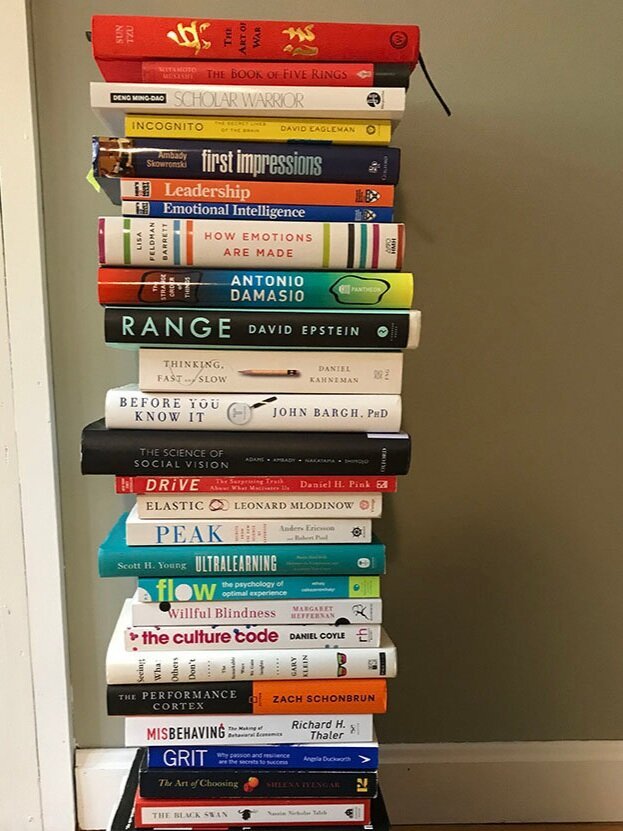Matters of the Mind
Thoughts, reflections and practical experiences from over a decade of artfully applying the science of interpersonal communication while working with teams and individuals around the globe.

Adaptive and Maladaptive Reaction to Threats
Through most of human history, humans have had to be very good at identifying and protecting against things that wanted to hurt us. While existential environmental threats still exist, we generally no longer face such threats on a daily basis. But that doesn’t mean our brains have stopped scanning the environment for potential harm; however, the environmental threats we’ve evolved to identify and avoid have now been replaced by actual or perceived threats to our identity and thus our place in society.

Achieving Your Goals or Succeeding with New Year's Resolutions
I remember, not very fondly, the days when I had to go to a gym to get a good workout (now I just carry heavy stuff most of the day as part of our homesteading projects) and every January the gym would suddenly be overrun with mobs of New Year’s Resolutioners. Fortunately for me, the majority of them would be gone by February, but less fortunate for those abandoning their workout plans.
Research on New Year’s Resolutions shows that more than 50% of people set aside their resolutions by the end of the first month. Here I provide a short summarize of researched-based ways we can better achieve our goals and resolutions.

Creating a Self-Healing Organization and the Wisdom of Porcupines
I was reading this morning about self-healing composites, materials that can repair themselves while still in operation. Picture an airplane wing healing its own cracks while you search for your seat. Pretty cool. I’ve also recently learned that porcupines are self-healing. They get a bit over adventurous, creeping too far out on weak tree branches, and thus often fall from trees. The result is they jab themselves with their own quills. Fortunately, the quills are coated in a natural antibiotic, so they heal quickly from their self-inflicted wounds.
Wouldn’t it be fantastic if we and our organizations could be similarly self-healing, especially so when our wounds are self-inflicted. And as far as corporations go, research seems to show that most wounds are self-inflicted. I believe, with the right mindset, our organizations can be self-healing, and in the process we can avoid inflicting further damage.

Why Mental Models Matter
As a leader in an organization, your intention, I assume, is to create a culture that promotes innovation and adaptation and makes employees feel like valued and important members of your team; but what if how you are communicating is creating a mental model of a workplace that is not aligned with these goals?

Why Not Ask Why?
“…half the time when someone asks you a question with a W, they aren’t really asking you a question. They’re making a statement in disguise.” (Amor Towles, The Lincoln Highway.)
This last week I was facilitating a group of undergraduate seniors on a tour of various law enforcement agencies in the Washington D.C. area. Some of them have never been to D.C. or on any trip like this and the conversation moves often to “why is it like this…and why isn’t it like that?” Why questions are awesome when we are that age and exploring new experiences and forging an understanding of the world. But in the world of investigative interviewing, whether corporate or law enforcement, as powerful as we may want to believe they are, why questions can be problematic.

Where Should You Place Your Confidence?
I receive about six different news updates in my email every day, and each seems to be trying to outdo the others with catchy and sometimes amusing (or misleading) headlines. Yesterday, the headline for one of them was, “90 percent of life is confidence”— a quote from an anime series I’ve not yet watched. That does sound good, and wouldn’t life be easy if that were true? In my courses I talk frequently about the importance of confidence; yet the headline made me think about all the ways confidence, and overconfidence, can lead us to suboptimal outcomes and how perhaps we can avoid this by refocusing where we place our confidence.

Are You in Control of Your Choices & Beliefs?
Up to 80 percent of the choices and decisions we make in life are made at the subconscious level. We don’t weigh the costs and benefits; we don’t consider the long-term implications. An answer simply arrives in our conscious brain, and we act on that answer. We believe it to be the best answer, and that it was made by our conscious, rational brain, so we rationalize until we’re comfortable with it, so long as it generally aligns with our beliefs and values…unless we consciously intervene and overrule the subconscious processes where most of this decision-making takes place.

Perspective Taking or Empathy
In any difficult conversation, and especially so when the stakes are high or we are under pressure, we tend to focus on our wants and needs—to see the situation through our lenses—and fail to take the time to see it from the perspective of the people with whom we are interacting. Any good photographer knows that if you change your perspective, you are likely to create something great and unexpected, and the same holds true for life and leadership. Take a different perspective and the outcome is likely to be better.

Toolboxes and Mindsets
Earlier this week, my peas and Japanese cucumbers had reached the stage where they needed trellising so I pulled out the fancy trellis a gardener’s catalogue had convinced me was going to be the most amazing thing. To my dismay, but hardly to my surprise, it would take me a full year to untangle the bright green plastic mess and it seemed not sturdy enough to support anything had I succeeded in untangling and stringing it up. I’m not annoyed at the catalogue; I’m annoyed at myself for failing to think like a gardener and instead thinking like someone who collects gardening tools and gadgets. I’d fallen prey to the “toolbox approach”, the thing I’ve most adamantly pushed back on the past ten or more years in the realms of investigating and interviewing.

Being Present in an Interview
If you are like me, the word presence, and worse, mindfulness, probably make you shudder a bit. They bring to my mind people who talk too softly, have a preference for gypsy pants, and might want me to perform a group rhythmic dance to help cure trauma I’m not aware of having. That all is pretty much the opposite of my thing. Still, being present and being mindful can make us so much better at interviewing and at our jobs and lives in general, and it doesn’t have to be such an annoying process to get there.

Shoshin - The Art of Beginner’s Mind
I’ve started teaching undergraduate courses in the Criminal Justice program at New England College. While teaching the concept of drawing inferences from available facts and information, the students were coming up with inferences about the given situation that my expert mind rebelled against. I wanted them to come to the inferences my years of professional experience had already locked in, but they were seeing far greater possibilities.

Learning through failure
Each year as the New Year begins, I reflect on what I accomplished last year, what I could have done better, and how I can be better this year. I imagine many of us do the same, making resolutions to learn more and to be better in some aspect of our lives. As I have been thinking about this, my thoughts keep returning to one book…

Practice
Reflections are tricky and come in many forms and applying them smoothly during an interview is a practiced skill. It develops through conscious, effortful practice at responding to difficult or provocative statements made by an interviewee. You can practice this by sitting down with a partner, asking them to throw challenging lines at you, and you reflect the issue back to them.

Festina Lente
Festina lente, meaning “make haste slowly”, is an oxymoron with roots back to the Roman Empire, where Caesar Augustus used it to admonish his generals against rashness. In the 15th century, the philosopher Erasmus wrote extensively on the phrase as a means of reflection and controlling passions.


Philosophy
I don’t profess to be smarter or wiser than you, it’s simply that I love sharing knowledge and I love working with other people to help them find the very best in themselves and to become the best at whatever they are pursuing.
